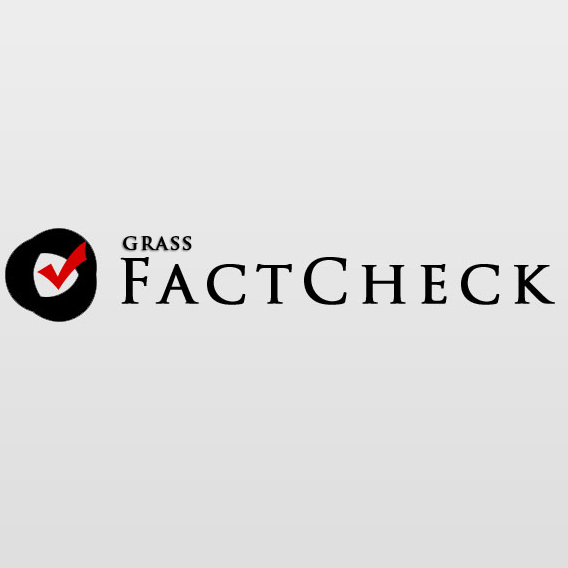Irakli Kobakhidze: “Price stability has been achieved alongside economic growth.”
Verdict: FactCheck concludes that Irakli Kobakhidze’s statement is HALF TRUE.
Georgia’s GDP grew 7.7% in January-September as compared to 7.9% in January-August.[1] The state budget is based on 6% growth. The nine-month rate exceeds that of any year from 2013 to 2019 but falls short of 2021-2024 levels. Growth slowed through the year – 9.8% in January-March and 6.5% in July-September.
Whilst the inflation target is set at 3%, the rate already reached 3.8% between January and October and in October alone it rose to 5.2%, constituting the highest level since March 2023. The National Bank has revised its inflation forecast for this year to 4% and for 2026 to 3.5%. Price increases are even steeper in food products – food prices rose by 10.8% in the third quarter.
Considering the accurate GDP data but misleading inflation claims, FactCheck concludes that Irakli Kobakhidze’s statement is HALF TRUE.
Analysis
Irakli Kobakhidze commented on economic growth and inflation, stating: “Preliminary data show that economic growth in the first eight months of 2025 reached 7.9%” … “Price stability has been achieved alongside economic growth. Inflation has declined and remained below the target level for two years since the beginning of 2023. It averaged 1.1% in 2024 whilst in many countries around the world inflation posed a significant problem. Price stability in our country continues this year as well.”
Economic growth constituted 7.9% between January and August. The rate of growth was 9.8% in the first quarter, slowed to 7.3% in the second and fell further to 6.5% in July-August. September data were released a week after Irakli Kobakhidze’s statement, confirming a 6.5% growth in the third quarter and lowering the January-September growth rate to 7.7%.
Graph 1: GDP Growth Rate
Source: National Statistics Office of Georgia
Both 7.9% and 7.7% are considered above-average growth. The state budget is based on a 6% increase and the current growth rate exceeds that of any single year between 2013 and 2019, although a slight downward trend is noticeable.
The GDP grew by 10.6% in 2021, largely due to the base effect. Most European countries experienced a large decline in 2020 and a high growth in 2021 like Georgia. More notable developments began in 2022 – the economy grew by 11% that year, 7.8% in 2023 and 9.4% in 2024.
Georgia ranked 29th in economic growth in 2021, 15th in 2022, 15th again in 2023 and third in 2024, according to World Bank data. Notably, in 2024 the top spot went to Guyana, rapidly enriched by newly discovered oil fields with a population of 800,000, followed by the non-sovereign Northern Mariana Islands with a population of 55,000.
It is impossible to predict the exact growth rate for the fourth quarter in advance. Whilst above-average growth is likely to continue based on the first three quarters, annual growth will probably match the lowest level of the past five years – at least, according to the nine-month data.
In addition to the slowdown in growth, another notable development is the rise in unemployment. Unemployment increased from 14% to 14.7% in the first quarter of this year as compared to the same period last year and from 13.7% to 14.3% in the second quarter. Quarterly data will be released in March and annual data in May providing more details. If the current rate of rising unemployment continues, it would be the first time in the past 15 years, excluding the pandemic years of 2020-2021, that unemployment increases despite economic growth. Unemployment consistently fell even under much lower conditions in the pre-pandemic period.
One factor contributing to the high growth from 2022 to 2025 may be the effects of the Russia-Ukraine war. Remittances from Russia increased by 400% in 2022 and since 2023 exports of passenger cars to Kazakhstan and Kyrgyzstan accelerated substantially. Kyrgyzstan, which had never ranked amongst the top ten export partners, is now in the first place and the markets of Tajikistan, Uzbekistan and Turkmenistan have also opened up from 2025.
Whilst FactCheck cannot definitively state whether cars from Central Asian countries are being re-exported to Russia, the percentage growth in exports, the number of cars sold and the unit price provide a logical basis for such a conclusion. It is important to note that Georgia does not violate sanctions as auto exports to Russia are prohibited – not to Kyrgyzstan.
The economy is growing faster than the planned based on three quarters of data regardless of the cause. At the same time, inflation for the nine-month period is above the target and shows a rising trend.
Double-digit inflation was recorded in 2022 for the first time since 1999 with consumer prices rising by 11.9%. Inflation was 9.6% in 2021. By the aforementioned measure, Georgia ranked 23rd in 2021 and 50th in 2022. The Russia-Ukraine was accelerated inflation globally and especially in the region. Inflation fell to 2.5% in 2023 and 1.1% in 2024.
The situation changed significantly from 2025 with inflation rising each quarter. Food prices in particular stand out: consumer prices increased by 5.2% in October whilst food and non-alcoholic beverage prices rose 11.7%. Overall inflation reached 3.8% from January to October, food inflation 8.3% and healthcare costs rose 8.2%.
Graph 2: Inflation Rate
Source: National Statistics Office of Georgia
Ground coffee prices rose by 13.6%, apples 14.4%, frozen fish 14.6%, mineral water 15%, wheat bread 19%, sunflower oil 19.3%, potatoes 25% and chocolate bars 32% in October alone.
The inflation rate has not exceeded the 5% mark since March 2023 up until October 2025.
Whilst inflation target is set at 3%, the National Bank has raised the 2025 forecast to 4% and the 2026 forecast to 3.5%.
Despite a downward trend, GDP growth remains above average and exceeds the planned level. Meanwhile, consumer prices are at a 2.5-year high with food price increases reaching double digits. Considering the accurate GDP data but misleading inflation claims, FactCheck concludes that Irakli Kobakhidze’s statement is HALF TRUE.








